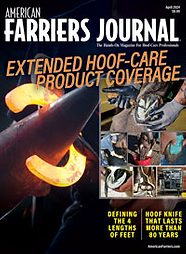By American Farriers Journal Staff
A long-time veterinarian serving in Congress introduced a bill this week that aims to end the practice known as horse soring.
Rep. Ted S. Yoho, a Florida Republican and a veterinarian for 3 decades, unveiled the Prevent All Soring Tactics (PAST) Act — H.R. 3268. The bill will amend the Horse Protection Act (HPA) of 1970.
Soring is the act of using chemicals or action devices that cause pain for a horse in order to achieve a high-stepping gait.
“The unethical treatment of animals is wrong and should be stopped wherever it exists,” Yoho says. “Horse soring has been illegal for well over 30 years. Unfortunately, soring is still practiced to this day in clear violation of the HPA.”
Earlier this year, Sen. Kelly Ayotte, a New Hampshire Republican, and Sen. Mark Warner, a Virginia Democrat, reintroduced a companion bill that would prohibit a Tennessee Walking Horse, a Racking Horse and a Spotted Saddle Horse from being shown, exhibited or auctioned with an “action device,” or “a weighted shoe, pad, wedge, hoof band or other device or material” if it’s constructed to artificially alter the gait of the horse and is not strictly protective or therapeutic.
The Senate version of the bill also aims to:
• Eliminate self-policing by requiring the United States Department of Agriculture to assign a licensed inspector if the show’s management indicates its intent to hire one. Licensed or accredited veterinarians, if available, would be given preference for these positions.
• Increase the penalties on an individual caught soring a horse from a misdemeanor to a felony subject to as much as 3 years’ incarceration, increases fines form $3,000 to $5,000 per violation. A third violation allows permanent disqualification from participating in horse shows, exhibitions, sales or auctions.
Ayotte’s bill currently has the support of 41 senators.
“As a veterinarian and lover of animals, I feel the time is now to stop the practice of horse soring for good,” Yoho says. “I am not the only one who feels this way. Roughly 280-plus organizations, associations, veterinary and animal health advocates, horse industry professionals and various other groups support the ending of this unnecessary practice.”
This past spring, the Tennessee Walking Horse National Celebration formed a new committee to ensure the welfare of the breed “via a predictable pre-show inspection.”
The committee is working the Veterinary Advisory Committee (VAC) to develop blood testing protocols, as well as other objective inspection protocols.







Post a comment
Report Abusive Comment